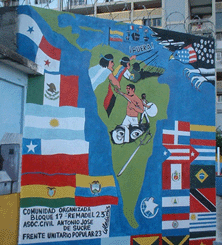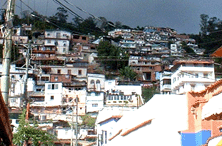
Admin


Fireworks, Politics and a Globalized Stew
Fireworks are exploding everywhere. The Caracas baseball team won a key game and they’ll now go on to final rounds, playing teams from various countries in the region. People have been driving around the city waving the team flag, honking horns and screaming out windows.
It’s the last day of the world social forum. Tents are being packed up and the streets are beginning to look eerily vacant. Buses full “foristas” roar off toward the airport. In many ways, it’s been a college semester smashed into a week. So much information has been floating around, so many panels listened to. However, just as it was at last year’s forum, the best part of the week wasn’t the panels themselves, but meeting like-minded people from all over the world. Meeting people in person whom I had only known through cyber space has been great.

The Social Architecture of Caracas
One of the most noticeable attributes of the city of Caracas is the contrast between social landscapes. Even the highway that was until recently the main route between the airport and Caracas gave the traveller a distant view of the barrios, the Do- It-Yourself neighborhoods , labyrinths of houses piled on top of eachother, built into the hills surrounding the city. Now, with the closing of the bridge on that main highway, the new route, La Carretera Vieja, the old highway, actually, rumor has it, a route first constructed by the Spanish 400 years ago, travellers now have an even more impressive entrance to the city. After a winding climb into the mountains, busses and taxis descend precipitously into the heart of Catia , the largest barrio in Caracas and, Ben says, the largest barrio/favela/slum in Latin America. Since the road has only two-lanes, and can often only accomodate one bus at a time on the hairpin turns, traffic has been backed up for hours.

The Crisis in US and World Media and the Growing Movement for Media Democracy
Information on TF’s panel tomorrow: If you’re in Caracas, we hope to see you there. If not, please send this info. to friends at the forum.
La Crisis de los Medios de Comunicación en EEUU., el Mundo, y el Movimiento a Favor de la Democracia en los Medios.
The Crisis in US and World Media and the Growing Movement for Media Democracy.
Panel – Taller
Jueves/Thursday – 26, Enero/January – 2006
Parque del Este, Estacionamiento este;
PE-06; 3:30 PM – Caracas,Venezuela
Participants – Participantes:

The Streets and the Forum in Caracas
Talking with people in the streets here in Venezuela makes me realize that the best way to get news is talking with people, face to face. It’s better than any newspaper or analytical essay. This way you can see expressions, hand gestures, clothes – people are living forms of media, transferring information and ideas better than any website ever could.
Today we met a couple of Argentines who had been traveling across the continent since October 2005. They went by boat from Asuncion, Paraguay up to Bolivia and Brazil, traveling mainly through jungle areas; they made conscious decisions to travel off the beaten path. This has taken them through almost every country in South America. From Venezuela, they’re heading to Suriname.

Dispatch from Venezuela: The Threat of Hope
Right outside of the subway stop in the barrio (neighborhood) called El 23 de Enero, the hillside is covered with brick houses built on land which was initially private property "taken" by the people that now live on it. With the new government, a lot of the "squatters" have been given titles to their land and houses so that now they are the owners and can sell the space, build onto it, or rent it out. Neighborhoods like this cling to the hillsides around the city, in a vast waterfall of tin roofs, orange bricks and cement. Steep alleyways and stairs weave through these areas. Jutting out of the barrios are gigantic rectangular apartment buildings from the 1960s that have laundry hanging out the window and waving in the wind. Hugo Chavez and the new Bolivarian Revolution in Venezuela receives most of its support and participants from areas like this.
